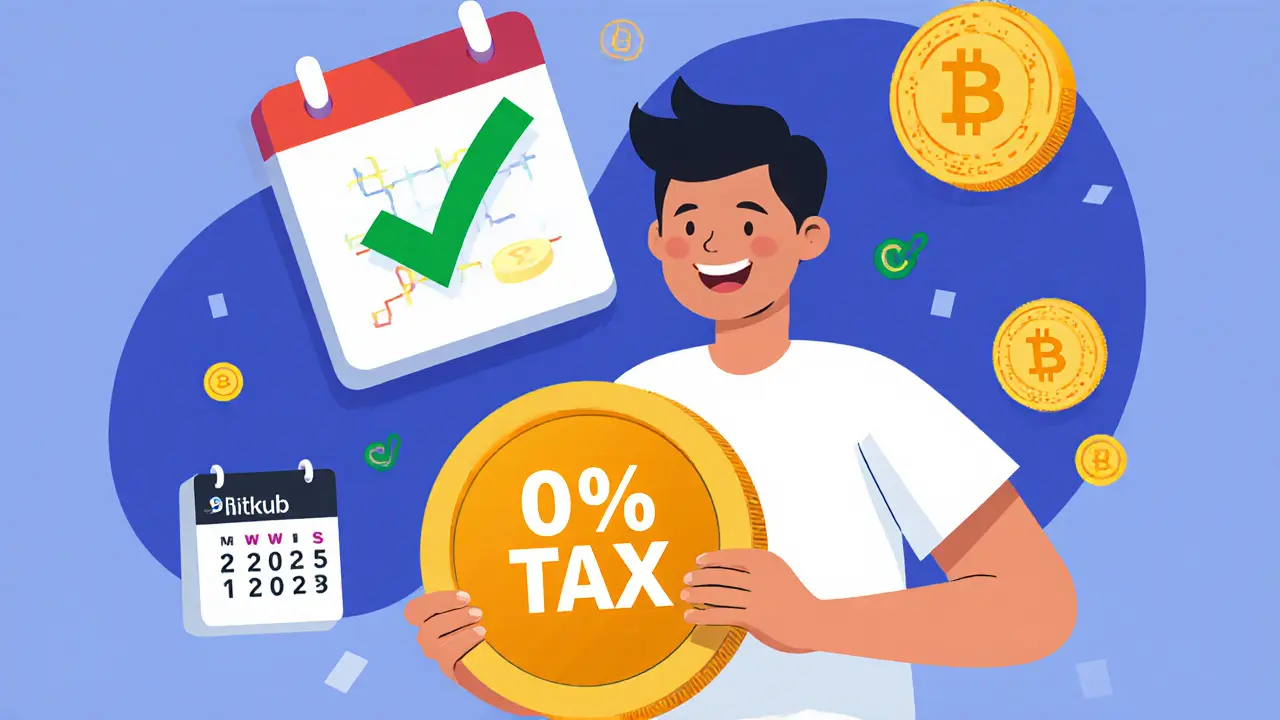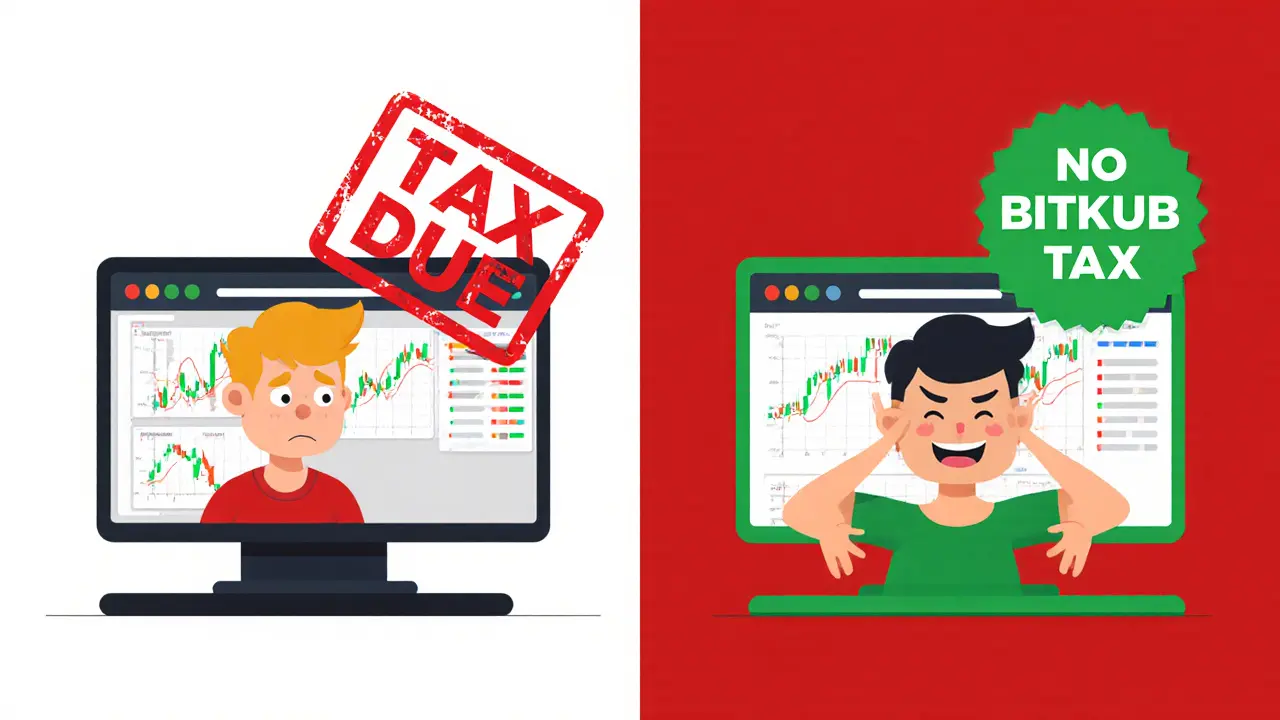
Crypto Tax Exemption Checker
Check Your Tax Exemption Status
Select your options to check if your transaction qualifies for Thailand's crypto tax exemption.
Many people think Thailand taxes crypto gains at 15%. That’s not true - and believing it could cost you money. As of January 1, 2025, Thailand doesn’t tax your crypto profits at all - if you trade on the right platforms. But if you’re using Binance, Kraken, or doing peer-to-peer trades? You’re still on the hook for taxes. The 15% number floating around? That’s not for locals. It’s for foreign companies earning crypto income in Thailand. Confusing? You’re not alone. Let’s cut through the noise.
Thailand’s Real Crypto Tax Rule: Zero Percent for Now
Thailand just passed a game-changing rule: from January 1, 2025, to December 31, 2029, Thai residents don’t pay any capital gains tax on profits from selling cryptocurrencies - but only if those sales happen through Thai SEC-licensed exchanges. That’s it. No 15%. No 5%. No tax at all. This isn’t a loophole. It’s official government policy, signed into law under Ministerial Regulation No. 399 (B.E. 2568). The goal? Turn Thailand into Southeast Asia’s digital asset hub.Before this, crypto profits were taxed like regular income - up to 35% for individuals, depending on your total yearly earnings. Now, if you bought Bitcoin on Bitkub or Coinone Thailand and sold it for a profit, you keep every baht. No reporting needed. No forms to file. Just cash.
Where the Tax Still Applies (And It’s a Big Deal)
This exemption doesn’t cover everything. In fact, most crypto activity outside of licensed exchanges still gets taxed. Here’s what’s not exempt:- Trading on international platforms like Binance, Coinbase, or Kraken - even if you’re in Thailand
- Peer-to-peer (P2P) trades, whether through Telegram, Facebook groups, or local apps
- Decentralized exchanges (DEXs) like Uniswap or PancakeSwap
- Staking rewards, mining income, or yield farming - these are still treated as ordinary income
- Crypto interest from lending platforms like Celsius or BlockFi
- Profits from derivatives, futures, or options trading
If you made $10,000 trading Solana on Binance, you owe tax. If you earned 0.5 ETH from staking Ethereum on Lido, you owe tax. The Thai Revenue Department hasn’t clarified exact rates for these yet, but they’re likely taxed as regular income - up to 35%. And yes, they can audit you. You need records.
The 15% Myth: What It Actually Means
The 15% figure you hear isn’t about Thai citizens. It’s about foreign entities. If a company based in the U.S. or Singapore earns crypto income from a Thai exchange - say, they run a trading bot on a Thai platform - Thailand withholds 15% of that income as tax. It’s a source-based tax, not a capital gains tax. Thai residents? Not affected. This rule exists to prevent foreign businesses from avoiding taxes while using Thailand’s financial infrastructure.That’s why you’ll see headlines saying “Thailand taxes crypto at 15%.” They’re not wrong - they’re just talking about the wrong group of people. If you’re a Thai citizen trading on local exchanges, this rule doesn’t apply to you. Ever.

What You Must Track - Even With a Tax Exemption
Just because you don’t pay tax doesn’t mean you can ignore your records. The Thai Revenue Department still expects you to track every qualifying transaction. Why? Because if you accidentally trade on an unlicensed platform, they need to know what you earned - and what you owe.Keep these details for every trade:
- Date and time of purchase
- Amount of crypto bought
- Cost in THB (including fees)
- Date and time of sale
- Amount of crypto sold
- Proceeds in THB (after fees)
- Name of the exchange used (must be SEC-licensed)
Use a spreadsheet or a crypto tax tool that lets you tag transactions by platform. If you’re using a licensed exchange like Bitkub, their transaction history is usually reliable. But if you’re moving crypto between wallets or doing P2P sales? You’re responsible for documenting everything yourself.
Why Thailand Did This (And Why It Matters)
This isn’t just about being crypto-friendly. It’s a smart economic play. Thailand’s Deputy Finance Minister Julapun Amornvivat said this move is meant to “boost Thailand’s economic potential” and help local entrepreneurs compete globally. By removing the tax burden, they’re pushing Thai investors to trade on homegrown platforms instead of offshore ones. That keeps money, data, and expertise inside the country.The government expects this to generate around $1 billion in new revenue - not from taxes, but from increased trading volume, job creation, and tech investment. More people trading on Bitkub means more fees for the exchange. More exchanges mean more jobs in tech and compliance. More foreign investors come in, bringing capital. It’s a classic case of taxing less to earn more.

What Happens After 2029?
The exemption ends on December 31, 2029. That’s five years - long enough for the market to grow, but short enough for the government to reassess. By then, Thailand will have data: How much trading happened? How many new businesses started? Did foreign investment increase? Did tax evasion drop because people stopped using offshore platforms?If the results are strong, the exemption could be extended. If not, they might bring back a lower rate - maybe 5% or 10%. Or they might keep it at zero, but only for trades under a certain threshold. Either way, don’t assume it’ll continue. Plan for the end date.
What You Should Do Right Now
If you’re a Thai resident with crypto:- Check if your exchange is SEC-licensed. The official list is on the Thai SEC website.
- Move any crypto held on unlicensed platforms (like Binance, Kraken, or P2P) to a licensed one - even if you’re not selling yet.
- Start tracking every transaction, even if you think it’s exempt. Better safe than audited.
- Stop assuming P2P or DeFi trades are tax-free. They’re not.
- Don’t rely on social media or Reddit for tax advice. Use official sources.
If you’re a foreigner living in Thailand? You’re still subject to the 15% withholding tax on any crypto income earned through Thai platforms. But your personal gains from local trades? Still exempt - as long as you’re a tax resident and trade on licensed exchanges.
Final Thought: This Is a Rare Opportunity
Very few countries offer a full capital gains tax exemption on crypto. Thailand is one of them - for now. And it’s not just about saving money. It’s about building something bigger: a homegrown digital economy that doesn’t depend on Silicon Valley or Wall Street. If you’re in Thailand and you’re holding crypto, this is your chance to play by rules that favor you - but only if you play by the right ones.Don’t let the 15% myth fool you. The real rule is simpler: trade on licensed exchanges, keep your records, and enjoy the tax break while it lasts.
Is cryptocurrency profit taxed in Thailand in 2025?
No, Thai residents don’t pay capital gains tax on cryptocurrency profits from January 1, 2025, to December 31, 2029 - but only if the trades happen on exchanges licensed by the Thai Securities and Exchange Commission. All other crypto income, like staking, P2P sales, or trades on foreign platforms, is still taxable.
What is the 15% tax on crypto in Thailand?
The 15% tax applies only to foreign companies earning crypto income through Thai-licensed exchanges. It’s a withholding tax, not a capital gains tax. Thai individuals trading on local exchanges pay 0% on profits. The 15% rate does not apply to personal crypto gains.
Are staking rewards taxed in Thailand?
Yes. Staking rewards, mining income, and DeFi yields are not covered by the capital gains exemption. They’re treated as ordinary income and subject to personal income tax rates (up to 35%). Until the Thai Revenue Department provides clearer guidance, assume all passive crypto income is taxable.
Do I need to report crypto trades on licensed exchanges?
You’re not required to file a tax return for exempt trades, but you must keep detailed records of all transactions. The Thai Revenue Department can audit you, and if you accidentally traded on an unlicensed platform, they’ll need your records to calculate what you owe. Record-keeping is mandatory - even when you owe nothing.
What happens to crypto taxes after 2029 in Thailand?
The current tax exemption ends on December 31, 2029. The government will review its impact before deciding whether to extend, modify, or remove it. Based on projected $1 billion in new economic activity, a partial exemption or lower rate (like 5%) is likely, but nothing is guaranteed. Plan for the possibility of taxes returning.
Can I use Binance or Kraken without paying tax in Thailand?
No. Profits from trades on Binance, Kraken, Coinbase, or any unlicensed platform are taxable in Thailand. The exemption only applies to trades on Thai SEC-licensed exchanges like Bitkub, Coinone Thailand, and others on the official list. Trading on international platforms still triggers capital gains tax.
Wesley Grimm
1 11 25 / 13:38 PMThe 15% myth is everywhere. I've seen it in crypto newsletters, YouTube shorts, even my accountant brought it up. The real rule is way simpler: licensed exchange = zero tax. Everything else? Still taxable. Stop trusting headlines. Check the Thai SEC website. It's not that hard.
Masechaba Setona
2 11 25 / 15:45 PMSo... you're saying the government is *encouraging* us to trade on local platforms? 🤔 That's not freedom. That's corporate capture disguised as policy. Where's the real choice? When did 'tax exemption' become a leash? 🐶
Kymberley Sant
4 11 25 / 15:05 PMi just moved all my btc to bitkub last week bc i was scared of the 15% thing lol. turns out i was panicking over nothing? wow. also i think they spelled 'exemption' wrong in the law but whatever 🤷♀️
mark Hayes
5 11 25 / 11:06 AMThis is actually huge. 🙌 I’ve been sitting on crypto for years because I thought I’d get taxed 35% if I sold. Now I can finally move my stuff without feeling like I’m burning cash. Just gotta remember to keep records. Not hard, just annoying. Thanks for the clarity. 🙏
Derek Hardman
6 11 25 / 22:52 PMI appreciate the thorough breakdown. The distinction between source-based withholding for foreign entities and capital gains exemption for residents is critical. Many international observers conflate the two. This clarification may significantly influence foreign institutional interest in Thai digital asset infrastructure.
Eric Redman
7 11 25 / 00:57 AMTHEY'RE LYING. This is a trap. The Thai government is tracking EVERY transaction. They're building a database so they can tax you later. You think you're getting a break? You're just being prepped for the next tax wave. I know people who got audited for 'unreported crypto activity' after using Bitkub. They didn't even do anything wrong!
Jason Coe
7 11 25 / 10:34 AMHonestly this is the most logical crypto tax policy I've seen anywhere. Most countries treat crypto like it's a lottery ticket or a drug deal, but Thailand's just saying 'if you trade on our platform, we don't care how much you make, just don't cheat'. I've been using Bitkub since 2023 and never filed a single form, and now I know why. Keeping records is just good sense anyway, even if you don't owe tax. It's like saving receipts for your grocery runs - you don't need them until the IRS shows up at your door.
Beth Devine
8 11 25 / 11:26 AMI'm so glad someone finally broke this down clearly. I was terrified I'd owe taxes on my staking rewards and didn't know where to look. Now I know to just track everything and avoid P2P. Also, if you're using a crypto tax tool, make sure it lets you tag platform types - I just updated mine to flag 'SEC-licensed' vs 'offshore'. Small thing, huge difference.
Brian McElfresh
9 11 25 / 19:07 PMYou think this is about tax? It's about surveillance. Every transaction on Bitkub is logged, timestamped, geo-tagged, and sent to a central server. The government doesn't want your money - they want your behavior. They're building a blockchain of your life. And when the exemption ends? They'll use your own data to prove you 'evaded' taxes. They already have your wallet addresses. They always do.
David James
10 11 25 / 10:29 AMThis is good news for everyone. Just move your coins to the right exchange and keep a simple list of buys and sells. No need to overcomplicate it. The government wants people to trade locally so the economy grows. That’s smart. We should all support that. Simple rules, big rewards.
Shaunn Graves
10 11 25 / 13:05 PMSo you're telling me I can legally avoid paying taxes on $50k in crypto gains? And you're just gonna sit there and say 'keep records'? That's not a policy, that's a loophole with a fancy name. What happens when someone makes $2 million? Are they just gonna say 'oh well, you used Bitkub'? This is a joke. The system is rigged.
Jessica Hulst
10 11 25 / 19:26 PMI find it fascinating how a tax exemption becomes a cultural moment. It’s not about the money - it’s about trust. The government is saying, 'We believe you can handle freedom.' But we’ve been conditioned to fear authority. So we panic about 15% instead of celebrating zero. And yet... we still track every transaction. Why? Because we don’t believe the exemption is real. We think it’s temporary. We think we’re being watched. We think the axe will fall. Maybe the real tax isn't the percentage - it’s the paranoia.
Nadiya Edwards
12 11 25 / 03:13 AMThailand is becoming a crypto tax haven. And who benefits? Rich expats and local elites. What about the small traders? They don't have the time to research SEC-licensed exchanges. They use Binance because it's easy. Now they're criminals by accident. This isn't empowerment. It's exclusion dressed up as progress. And don't even get me started on how this will affect the informal economy.
Ron Cassel
12 11 25 / 11:36 AMThis is a distraction. The real story? The Thai SEC is owned by the same people who run the banks. They're pushing you to use Bitkub so they can control your money. The 'exemption' is a lure. They'll shut down Bitkub tomorrow and say 'you traded illegally'. They've done it before. Trust no one. Especially not governments that give you 'free money'.
ISAH Isah
14 11 25 / 03:55 AMThe policy is sound in theory but execution remains questionable. In Nigeria we have similar initiatives that collapse under bureaucratic inertia. One must question whether the Thai Revenue Department possesses the technical capacity to enforce record-keeping obligations without imposing undue burden on retail participants. Moreover, the distinction between licensed and unlicensed platforms may be opaque to many users lacking access to legal counsel or digital literacy resources. One hopes this is not merely performative policy.